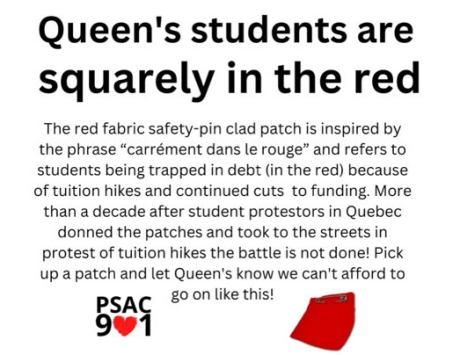Reports
You are here
Graduate workers and students in Ontario refuse to be “squarely in red.”

March 22, 2023
PSAC 901 shouted it loud, shouted it clear: graduate workers and students in Ontario refuse to be “squarely in red.”
PSAC 901, the graduate workers union at Queen’s University in Kingston, Ontario, held its second rally in a row with a demand to abolish tuition fees on March 22nd. More than a hundred graduate and undergraduate students gathered in front of the Principal Patrick Deane’s office to rally against low funding, high tuition, and the cost-of-living crisis.
Graduate student-workers at Queen’s use the same symbol pinned by their peers in Montreal, Quebec over a decade ago in their fight against tuition hikes: the red fabric safety-pin patch. This symbol was used to show how students were trapped in debt (red square) and poverty. Today, the reality of graduate worker and undergraduate student life in Canada is even worse with the increasing student poverty.
PSAC 901’s statement on high tuition fees received support from many graduate student associations and community organisations. Graduate workers from Ottawa were also present in the rally to show their support and echo the fact that graduate student-worker and undergraduate student poverty is a grievance across the universities in Ontario, and even beyond the province.
As the federal and provincial public funding for universities has shrunk over the decades, the revenue generation model adopted by universities in Canada is heavily reliant on the tuition fees accrued from the students. While student poverty influences all the students from low and middle-income families, migrant students bear the brunt of this commercialized model since they are treated as the main source of revenue generation for higher education with the disproportionately high tuition rates which they are forced to pay to access education in Canada.
The statement from the PSAC 901 highlights some of the pressing concerns with numbers that speak for themselves:
- Food costs in Ontario have risen by more than 10% in the last year and Food Insecurity Report from last year indicates that more than half of the Food Bank users are graduate students.
- The current median rent in Kingston is over $1,600 per month, with an increase of over 22% since the last year. University housing is completely insufficient to meet the needs of housing for graduate students.
- The minimum funding for graduate students is only $18,000 before tuition is deducted from their earnings, and there is no minimum funding for Masters’ Students and no guaranteed funding for anyone beyond the four years of timely completion for PhD students.
- Queen’s own estimates show that the cost of living per a domestic graduate student without a dependent is around $30,000 and for an international student, this rises to around $40,000. With dependents, this figure rises to $60 to $70 thousand dollars per year.
At the rally, the speakers from PSAC 901, fellow graduate unions from Ottawa, OPIRG Kingston, Katarokwi Union of Tenants (KUT) and undergraduate students all reiterated that more and more students are falling further into debt and poverty. The speeches drew attention to the massive amounts of investment funds that Queen’s chooses not to use to reduce student poverty, the complicity of the administration in the lobbying efforts to remove tuition freeze which has been in place since 2019 in Ontario and the ongoing investment in fossil fuel extraction projects on the Indigenous land.
An international student spoke about the high percentage of visible minorities among the struggling students at Queen’s and she called the Queen’s administration out for paying only lip service to equity, diversity and inclusion principles while, in reality, condemning international students from the Global South to poverty.
An undergraduate student spoke about the connection between the racist, elitist and sexist culture on campus and shutting the doors of the university to working class students. He added that, “Every student in isolation feels that they are a minority who is forced to work part-time or full-time to fund their studies; however, we should not forget that for every student who turned up here in this rally, there are ten more students out there suffering from the same kind of poverty you are suffering. We are prevented from sharing our experience with one another systematically. We should break this isolation and get organized.”
The rally showed that there is a growing anger among graduate and undergraduate students about the ostensibly public, in reality, privatized model of higher education system.
To add to the significance of the rally, it took place on the same date when graduate students in Quebec shook the streets of Montreal for weeks to fight against the tuition fee spikes a decade ago. A graduate worker from Ottawa said in their speech that “whatever we have won is the result of the fight of the workers and students from previous generations. It is our turn to keep up the good fight. Our anger is fuelling a revolution, and this is a Canada-wide anger. We are unstoppable and our generation is coming to the scene with this resolution.”
With the amazing spirit in the rally, the participants stuck their demands on the door of the principal’s building. As everyone was parting, they chanted, “We believe that we will win!”. By putting the idea of “free education” on the agenda for graduate workers and undergraduate students, PSAC 901 is increasing the stakes and speaks out what has been unimaginable for decades. As the struggle against privatization of health and cutting down of public services are rising, PSAC 901 is joining in the radical anger that characterizes the ranks of labour today.
For those who are interested in reading the Tuition Fee Statement by PSAC 901, here is the link: https://psac901.org/?p=1804
Section:









